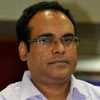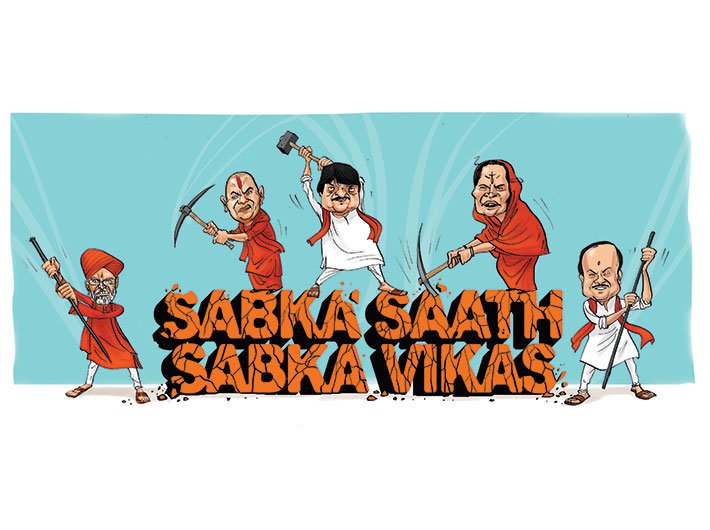The president has spoken, concerned citizens have spoken; now it’s your turn, Mr Modi!
It is not easy to find anything common between renowned Marxist historian Irfan Habib and corporate leader Kiran Mazumdar-Shaw, but both have expressed their fear that India is turning into a mirror image of Pakistan after one and half year of the Modi rule.
In May 2014 Narendra Modi became the prime minister, overcoming many odds, because people of the country had reposed their faith in his promise of ‘Sabka Saath, Sabka Vikas’. Of course, his election campaign sometimes went beyond ‘inclusive development’, and many BJP leaders sought to win votes by pitting one community against the other, but people thought that Modi will decisively take corrective measures and silence ‘fringe elements’ as he would lead the country to a new era of development after a massive mandate.
Eighteen months later, the scene is very different. More and more Indians are becoming worried about growing intolerance in society.
Reports of persecution of religious and caste minorities in India are drawing attention worldwide. Writers, historians, scientists, social scientists, and film-makers are returning their awards expressing concern about the “highly vitiated atmosphere prevailing in the country, characterized by various forms of intolerance,” as quoted in a joint statement issued by a group of 53 historians from across India including Romila Thapar, Irfan Habib, KN Pannikar, D N Jha.
Dadri, where a Muslim man was lynched over a rumour of beef eating, has become the symbol of an ‘intolerant India’ 23 years after the demolition of the Babri mosque. Those who were hopefully labeled fringe elements have come to include those in the ranks of chief minister, cabinet minister and MP, and they continue to make inflammatory statements against minorities. They do not seem to have any other agenda than dividing the society between the majority ‘us’ and the minority ‘them’. Elections in Bihar – a make-or-break situation for Modi to remain the sole uncontested leader – provided further reasons for this communal polarisation, and electioneering there was marked by a new low of attacks and counterattacks. Though Modi and his NDA began the campaign by talking of development and jobs, they soon resorted to talking about Muslim population figures, cow slaughter, beef eating, terrorism and Pakistan, as they left no stone unturned to win Bihar.
Historian Irfan Habib sees the RSS, the ideological backbone of BJP, as the real threat to the country. Modi has repeatedly asserted that he is a proud swayamsevak of RSS, and Habib told Times of India in an interview, “It is no secret that MS Golwalkar, the ideological fountainhead of the RSS, was an admirer of Adolf Hitler and the Nazi Party. This government is now trying to realize Golwalkar’s dream. Just like in Nazi Germany, they are using propaganda to spread paranoia. They have created a very strong Hindu-communal ideal... Under RSS rule, India is turning into a mirror image of Pakistan.”
The situation is so disturbing that not only authors and artists, scholars and intellectuals have spoken out, now even the business class is getting worried. International rating agency Moody’s Analytics cautioned Modi that India might lose domestic and global credibility if he did not rein in controversial members of his party. So it was no surprise that Kiran Mazumdar-Shaw, chairperson of pharma major Biocon Limited, spoke in Habib’s language and told the Sunday Express: “I am very disturbed by fringe elements trying to disturb communal harmony. Communal harmony has to be preserved for economic progress to happen… If we ignore the fringe elements then we will have a situation like [the one] in Pakistan or the Islamic State.” Her remarks came after she indicated her support to Infosys founder NR Narayana Murthy who had told the NDTV, “The reality today is that there is considerable fear in the minds of minorities in India… Economic progress can happen only if there is no distrust, no fear and if the majority community doesn’t oppress the minority community, doesn’t want the minority community to do what it wants.”
Finally, even the Reserve Bank of India governor, Raghuram Rajan, put “political correctness” aside, and emphasised the need “to improve the environment for ideas through tolerance and mutual respect”. Addressing students at the convocation of his alma mater, IIT Delhi, Rajan said protection should be given not to “specific ideas and traditions” but to the “right to question and challenge” and the “right to behave differently so long as it does not hurt others seriously”.
All that is being expected from Modi is to silence the so-called fringe elements, but for reasons best known to him, he has refused to do so.
That has forced president Pranab Mukherjee to express his concern on growing intolerance – thrice in less than a month. Inaugurating the golden jubilee celebration of the Delhi high court, he underlined the need to preserve India’s “multiplicity”. “Our country has thrived due to its power of assimilation and tolerance. Our pluralistic character has stood the test of time,” he said on October 31. He pointed out that India is a country of 1.3 billion people who belong to different ethnic groups, speak 122 languages and 1,600 dialects, and profess a number of faiths.
But BJP leaders have refused to acknowledge the president’s message. They still argue that either there is no intolerance or if there is, it has been always there. As for the record number of awards being returned and a wide variety of thought leaders speaking out against the government, the BJP’s explanation is that the protest has been ‘manufactured’ by the Congress.
When popular film star Shah Rukh Khan too voiced his concern, BJP national general secretary and minister in Madhya Pradesh Kailash Vijayvargiya took no time to label him a traitor. “Shah Rukh Khan lives in India, but his heart is in Pakistan. His films make crores here but he finds India intolerant,” he tweeted. Even as union minister Prakash Javadekar rushed in to control the damage by saying that Vijayvargiya was not official spokesperson of the party, the party line was once again made clear by MP Yogi Adityanath who said, “I am saying these people are speaking the language of terror. I think there is no difference in the language of Shah Rukh Khan and Hafiz Saeed.”
The most important question, then, is if the super-powerful prime minister is helpless in stopping the supposedly fringe elements or if this is happening with his full blessings. Modi’s rivals claim that the Hindutva motor-mouths very well know their leader’s views, the us-vs-them strategy was formulated by Modi himself and he has no regret of it. It is of course Modi who has brought back the long-forgotten issue of the holy cow in political discourse: he spoke of the ‘pink revolution’ during the 2014 campaign, accusing the Congress of giving subsidies to those who slaughter cows. He also used Pakistan in elections and several time challenged ‘Miyan Musharraf’ during his speeches. Add to that his past remarks on Muslims, “we-five-and-our-25” onwards, and it is obvious that the “fringe” elements are actually his master’s voice.
Modi’s own remarks during the Bihar campaign, referring to the ‘other community’ in the quota debate as if they were not citizens of India, are not much different from what the sadhvis and yogis of BJP say. Publication of the ‘cow’ advertisement a day before the final round of polling was not possible without the consent of top leadership.
It is high time Modi reviewed his strategy. He is not the prime minister of ‘us’ only, he would be judged by his action towards ‘them’ also. The president has spoken thrice, now it is the prime minister’s turn to speak strongly and effectively against intolerance.
feedback@governancenow.com
(The article appears in the November 16-30, 2015 issue)

